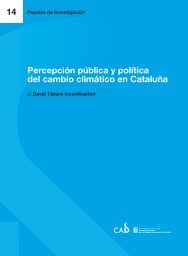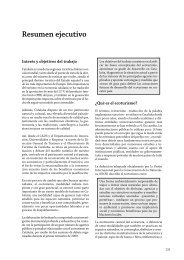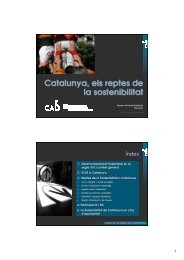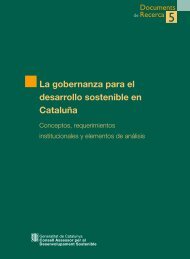Estratègies per al desenvolupament sostenible - Generalitat de ...
Estratègies per al desenvolupament sostenible - Generalitat de ...
Estratègies per al desenvolupament sostenible - Generalitat de ...
Create successful ePaper yourself
Turn your PDF publications into a flip-book with our unique Google optimized e-Paper software.
- the <strong>per</strong>formance of individu<strong>al</strong> strategy actors in implementing the strategy, interms of the effectiveness and efficiency of their service provision and management.Ev<strong>al</strong>uating the results of the strategy is necessary to correlate actions with specificchanges in human and environment<strong>al</strong> conditions, test the strategic hypotheses(choice of priority issues, an<strong>al</strong>ysis of un<strong>de</strong>rlying factors, prescription of actions),assure accountability, capture lessons and <strong>de</strong>velop capacity through learning.Reporting and dissemination of the above findings is necessary to feed back keymessages to key stakehol<strong>de</strong>r groups, and thus enable them to continuously improvetheir behaviour, the strategy itself and its component activities. Some –or toofrequently <strong>al</strong>l– of these elements have been missing from many strategies in thepast.From ex<strong>per</strong>ience, effective monitoring and ev<strong>al</strong>uation can be <strong>de</strong>scribed as follows:Constructed and <strong>de</strong>veloped as a system that combines the functions <strong>de</strong>scribedin the previous section, and makes them a core part of the over<strong>al</strong>l strategymanagement system.A mix of intern<strong>al</strong> and extern<strong>al</strong> exercises. Intern<strong>al</strong> approaches help with self-reflectionand adaptation. Extern<strong>al</strong> exercises complement this by offering b<strong>al</strong>anced judgement(by in<strong>de</strong>pen<strong>de</strong>nt and/or multi-stakehol<strong>de</strong>r groups).Driven by strategy objectives rather than (as so often at present) by the availabilityof data. This <strong>al</strong>lows the generation of focused information rather than beingoverwhelmed by comprehensive (and not <strong>al</strong>ways useful) data. Monitoring everythingis impossible. It is impossible in theory because we do not know enough aboutnatur<strong>al</strong>, soci<strong>al</strong> and economic systems to know <strong>al</strong>l the aspects we could record –and new techniques and approaches are being <strong>de</strong>veloped <strong>al</strong>l the time. It is impossiblein practice because there will never be enough resources – time, money, equipment,ex<strong>per</strong>tise – to record everything. Therefore, data selection is necessarily selective.Related to good baseline data to be able to compare “before and after” or “withor without action” situations. Many countries <strong>al</strong>ready un<strong>de</strong>rtake regular stocktakingsuch as state-of-the-environment reports, which could be built on to becomecomprehensive sustainability assessments.180
















